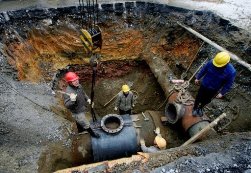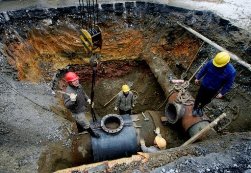 China said on Tuesday that it had detained seven company executives after tonnes of industrial waste including a toxic metal polluted a river, threatening water supplies for millions of people.
China said on Tuesday that it had detained seven company executives after tonnes of industrial waste including a toxic metal polluted a river, threatening water supplies for millions of people.
A 300-kilometre (190-mile) stretch of the Longjiang River in the southern region of Guangxi could eventually be contaminated, sparking panic buying of bottled water in nearby cities, state media said.
The official Xinhua news agency quoted unnamed experts as saying that the amount of illegally released waste in the waterway was unprecedented at an estimated 20 tonnes.
Jinhe Mining Co. has been blamed for dumping cadmium, a carcinogen which can seriously damage the kidneys, bones and respiratory system, into the river in a spill that was discovered on January 15.
The government has decided to go after other polluters, inspecting more than a dozen factories on the river and stopping production at seven plants, the China Daily newspaper said.
Authorities have taken into custody seven executives from companies deemed responsible for polluting the river, according to a Guangxi government statement provided to AFP on Tuesday.
The firms include the Jinchengjiang Hongquan Lithopone Materials Factory, it said, without naming the others. Lithopone is a pigment used in paint.
The initial discharge happened in Hechi city but was now flowing downstream, endangering drinking water for 1.5 million people in Liujiang city, state media said. It was also approaching Liuzhou city, with a population of 3.7 million.
Guangxi officials and spokesmen for Hechi and Liuzhou declined to comment when contacted by AFP.
But Hechi mayor He Xinxing was quoted as saying by Xinhua: “It is a critical time right now because downstream drinking water safety is in jeopardy.”
A supermarket worker in Liuzhou said his store had been selling 2,000 bottles of water a day as frightened residents stocked up despite government pledges that the city’s tap water was safe for now.
“Sales have been like this for a week. In wintertime, normal daily sales of bottled water are 100 to 200 bottles,” he told AFP.
Activists say officials in China often turn a blind eye to industrial pollution or even collude with companies, as they seek to push forward local economic development at all costs.
Authorities have mobilised thousands of soldiers to dump chemical neutralisers into the river to dilute the cadmium, but levels of the metal were still over 25 times higher than the official limit in some parts on Monday.
State television showed workers in protective yellow suits dumping bags of powder, identified as aluminium chloride, into the water to act against the cadmium.
Environmentalists criticised local officials, saying poor supervision triggered the pollution in the first place.
“Oversight before the incident was seriously inadequate,” Greenpeace said in a statement. “The problem lies in poor supervision on a day-to-day basis.”
Ma Jun, director of the Beijing-based Institute of Public and Environmental Affairs, said pollution involving cadmium — widely used in batteries — is alarming.
“This water pollution can be very severe, since it was caused by a kind of heavy metal that cannot dissolve naturally and is highly toxic, which could make the pollution last for quite a long period,” he told AFP.
In its latest update on Tuesday afternoon, the Liuzhou city government said cadmium levels were two times higher than the government standard.
Many waterways in China have become heavily contaminated with toxic waste from factories and farms, pollution blamed on three decades of rapid economic growth and lax enforcement of environmental protection laws.


